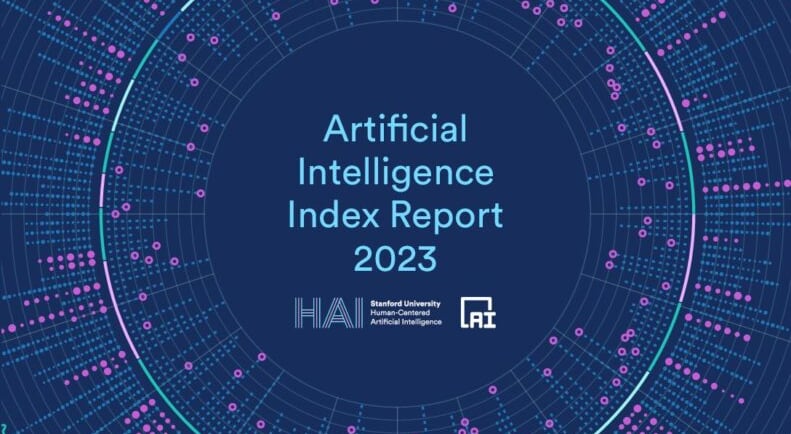Brief summary of AI Index Report 2023
We're about to enter a new year. So let's take a moment to analyze together how artificial intelligence has changed our lives by analyzing the AI Index report 2023.
IA NEWS
Yanhel AHO GLELE
12/28/20234 min read
The AI Index Report for 2023 was unveiled in April of this year. As is customary annually, this report is crafted by a diverse cadre of academic and industry experts, overseen by the Stanford Institute for Human-Centered Artificial Intelligence (HAI), in collaboration with various organizations. Its primary objective is to collate, analyze, and present pertinent data on artificial intelligence (AI), providing policymakers with insights to make judicious and ethical decisions regarding AI. The report is structured into six chapters, covering Research and Development, Technical Performance, Technical Ethics of AI, Economy, Education, and Policy and Governance. On April 20, 2023, the SST had the privilege of attending the presentation of this report at an event organized by the British consulate in San Francisco.
What is the AI Index Report ?
Given the hype and meteoric rise of AI in recent years, it has become imperative to promote the responsible use of artificial intelligence technologies.Addressing an imperative need, the AI Index Report has been annually published since 2017 (excluding the year 2020). This comprehensive report is crafted by a diverse group of academic and industry experts under the auspices of the Stanford Institute for Human-Centered Artificial Intelligence (HAI). Collaborative efforts with various organizations, including the Center for Security and Emerging Technology at Georgetown University, LinkedIn, NetBase Quid, Lightcast, and McKinsey, contribute to the richness of the AI Index Report.
Significantly, in the sphere of AI regulation, the universities in the Bay Area of San Francisco play a pivotal role in fostering dialogue by convening leading experts in the field. For instance, on April 13, 2023, the CodeX FutureLaw 2023 conference unfolded at the Stanford Center for Legal Informatics. This gathering brought together a diverse array of professionals, spanning legal experts, computer scientists, educators, social scientists, insurance specialists, and legislation experts. Key discussions revolved around the capacity of generative AIs to successfully navigate the bar exam, disparities in access to justice (including access to generative AIs), biases inherent in generative AIs employed in crime prevention, the concept of "adaptive law," and associated regulations, the use of generative AIs on social networks, and the profound shifts anticipated in citizen-government interactions.
Concurrently, the CITRIS and the Banatao Institute at the University of Berkeley conducted a series of seminars throughout April 2023, delving into issues related to the control and regulation of AI. The opening seminar by Stuart Russell, a professor of computer science and author of the acclaimed "Artificial Intelligence: a modern approach," established the groundwork for the innovative concept of "Beneficial AI." Russell emphasized the critical importance of aligning AI goals with human objectives. Subsequent seminars provided insights into reinforcement learning (Sergey Levine), the economic dimensions of AI and the individual's role (Michael I. Jordan), and the impacts on intellectual property protection (Pamela Samuelson).
However, despite the exemplary mobilization of experts and communication efforts, there is an apparent challenge within these communities to propose AI governance solutions that are not only impactful but also implementable in the short term and on a global scale. These discussions, currently confined to a select group of experts, have yet to be integrated into a consultative approach involving the general public, despite the profound impact of these advancements on society at large.
The 10 key points of this year :
The AI Index Report serves as a benchmark document for the AI community, albeit with a predominant focus on the United States. The content of its six chapters can be distilled into several key highlights.
Industry Surpasses Academia in AI Model Publications: Until 2014, most machine learning models were published by universities. In 2022, the trend reversed, with the industry producing 32 models compared to three from academia. Building advanced AI systems increasingly requires vast amounts of data, computing power, and financial resources, assets inherently more abundant in industry players than in non-profit organizations and universities.
AI Yields Breakthroughs, Evaluation Tools Require Revision: Traditional evaluation tools are rapidly overwhelmed by current AI capabilities, necessitating the development and publication of new, more comprehensive tool suites. Examples include the Beyond the Imitation Game Benchmark (BIG-bench) and the Holistic Evaluation of Language Models (HELM).
Environmental Impact of AI: Studies reveal the significant environmental impact of new AI models. In 2022, training a model like BLOOM was estimated to emit up to 25 times more carbon than a one-way flight from New York to San Francisco. However, AI is expected to accelerate the transition to sustainable development, exemplified by models like BCOOLER optimizing energy management.
AI Models Accelerate Scientific Progress: In 2022, AI models were utilized to facilitate simulations on hydrogen fusion, enhance energy management efficiency, and generate new antibodies. Major scientific advancements are anticipated in the coming years, akin to the development of vaccines and treatments for COVID-19.
Increase in Incidents of AI Misuse: According to the AIAAIC database, incidents related to unethical AI use have multiplied by 26 since 2012. Yet, the global impact of these malicious uses remains relatively moderate to date.
Growing Demand for AI-related Professional Skills: In nearly all U.S. industries with available data (except agriculture, forestry, fishing, and hunting), job postings related to AI increased from an average of 1.7% in 2021 to 1.9% in 2022.
First Decrease in Private Investment in a Decade: Global private investment in AI amounted to $91.9 billion in 2022, reflecting a 26.7% decline since 2021. However, over the past decade, AI investment has significantly increased, being 18 times higher in 2022 than in 2013.
Stagnation in AI Adoption, But Competitive Edge for Adopters: While the proportion of companies adopting AI has stabilized between 50% and 60%, it has more than doubled since 2017. Adopting companies report significant cost reductions and increased revenue.
Rising Interest of Policymakers in AI: Legislative records from 127 countries show a substantial increase in the number of bills addressing Artificial Intelligence, rising from 1 in 2016 to 37 in 2022.
Differing Public Perceptions of AI: In a 2022 IPSOS survey, 78% of Chinese respondents (the highest among the studied countries) agreed that products and services using AI have more advantages than disadvantages. In contrast, only 35% of Americans (among the lowest percentages) shared this view, with the French even less enthusiastic.
Subscribe to our newsletter
Enjoy exclusive special deals available only to our subscribers.
Contacts
blockainexus@gmail.com
main@blockainexus.com
Get in touch
Opening hours
Monday - Friday: 9:00 - 18:00


